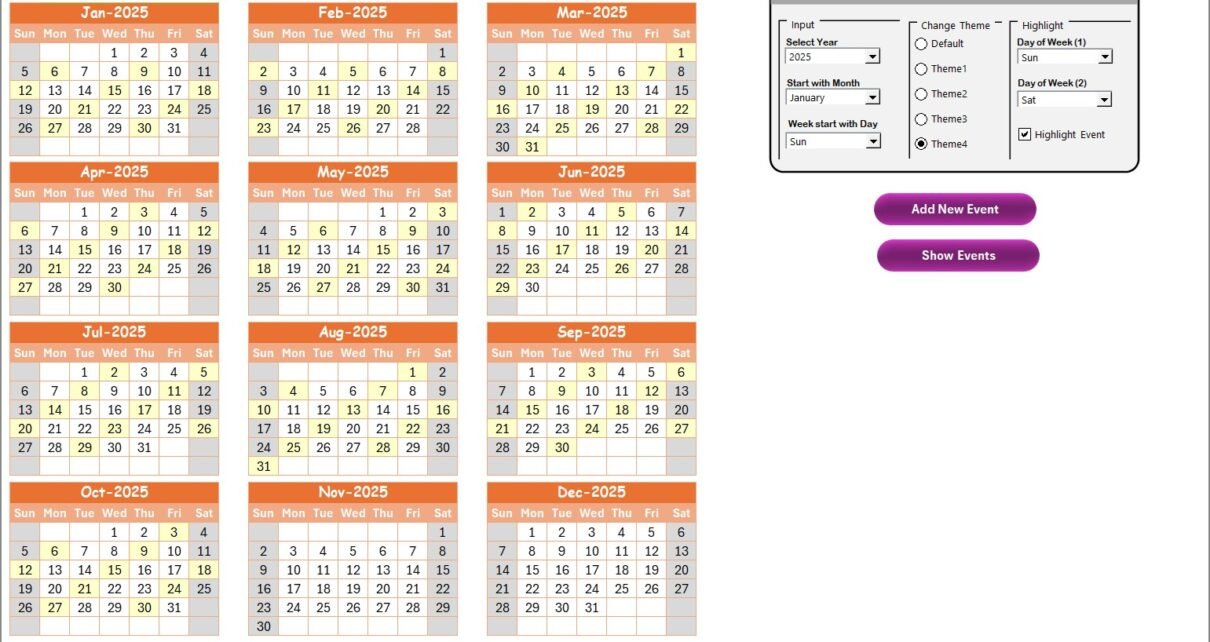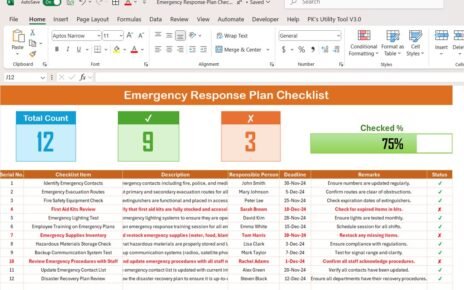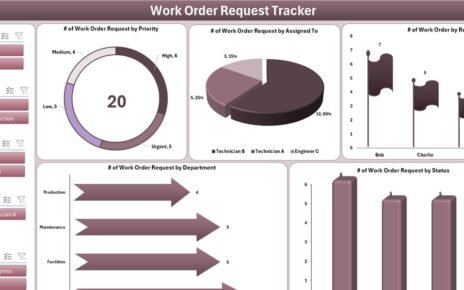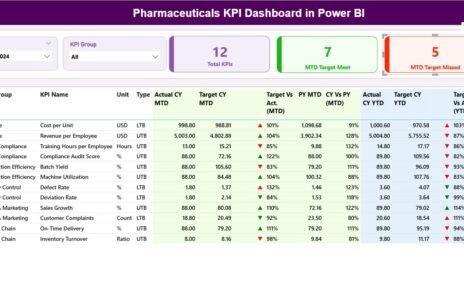Finance operations form the backbone of every business. From budget planning to auditing and from cash flow management to compliance reporting, finance teams handle critical activities that determine the stability and growth of an organization. As businesses expand, managing finance operations manually becomes inefficient, error-prone, and time-consuming.
Artificial Intelligence (AI) has entered the finance landscape as a game-changer. AI can automate repetitive tasks, detect anomalies, and provide real-time insights. However, implementing AI in finance operations requires careful planning, execution, and monitoring. That is where a Finance Operations AI Implementation Calendar in Excel becomes a vital tool.
This calendar provides a structured approach to plan, track, and evaluate every stage of AI adoption within finance functions. Designed in Excel, it is user-friendly, highly customizable, and does not require complex software installations. Whether you are a CFO, finance manager, or AI project lead, this tool helps you stay organized and ensures smooth implementation.
Click to Purchases Finance Operations AI Implementation Calendar in Excel
What Is a Finance Operations AI Implementation Calendar?
A Finance Operations AI Implementation Calendar is an Excel-based template that allows organizations to manage their AI adoption roadmap in finance. It combines planning, scheduling, and event tracking features into one interactive tool.
Instead of juggling multiple spreadsheets and notes, finance teams can use this calendar to:
-
Track annual, monthly, and daily activities.
-
Schedule AI implementation tasks such as pilot testing, staff training, and deployment.
-
Capture detailed information about events, timelines, responsibilities, and outcomes.
-
Highlight critical milestones and monitor progress in real time.
Structure of the Excel Calendar
This calendar is structured across five worksheet tabs, each serving a unique purpose. Let’s explore them in detail.
Home Sheet Tab

The Home sheet acts as the index page for the entire calendar. It provides quick navigation buttons to jump to other sheets, such as:
-
Annual View
-
Monthly View
-
Daily View
-
Events
This sheet makes the template simple and user-friendly, especially for first-time users.
Annual View Sheet Tab

The Annual View sheet displays a 12-month calendar where all planned AI implementation events are visible at a glance.
Features of the Annual View:
Control Panel:
- Input Group – Select the year, change the starting month, or adjust the start day of the week.
- Change Theme Group – Apply one of five color themes to customize the workbook’s look.
- Highlight Group – Highlight weekends (e.g., Saturday, Sunday) or important days in specific colors. You can even highlight events in yellow for quick visibility.
-
Add New Event Button: Easily add events like “AI model training” or “Finance data audit automation kickoff.”
-
Show Event Button: Review a list of all scheduled events for the selected date.
This sheet is ideal for CFOs or finance leaders who want a bird’s-eye view of the AI project roadmap.
Monthly View Sheet Tab

The Monthly View sheet provides a detailed look at events scheduled for a specific month.
Features:
-
Select Month and Year at the top.
-
Display one event per date on the calendar. If more than one event exists, it will show a note such as “more than 1…” for clarity.
Two action buttons:
- Add New Event – Create new entries for workshops, testing phases, or finance audits.
- Show Event – View the list of events on a selected date.
This sheet is practical for project managers and team leads who need to coordinate detailed monthly schedules.
Click to Purchases Finance Operations AI Implementation Calendar in Excel
Daily View Sheet Tab

The Daily View sheet shows a list of events within a selected date range.
Key Functions:
-
Enter a Start Date and End Date at the top.
-
Use the Refresh button to update the event list for the chosen range.
-
Add events using the Add New Event button.
This sheet helps finance teams track daily AI implementation tasks such as model testing, compliance checks, or automation reviews.
Events Sheet Tab

The Events sheet is the database that stores every detail of scheduled events.
Columns include:
-
ID: Auto-generated record number
-
Date: Date of the event
-
Day: Weekday (e.g., Monday, Tuesday)
-
Event Name: Short title such as “AI Audit Automation Launch”
-
Time: Scheduled time
-
Location: Physical or virtual meeting location
-
Description: A short summary
Buttons provided:
-
Add New Record: Open a form, enter details, and submit.
-
Update Existing Record: Select the ID, edit details in the prefilled form, and update.
-
Delete Record: Remove outdated or irrelevant events with a single click.
This sheet acts as the backbone of the template, ensuring that all events remain organized.
Why Use AI in Finance Operations?
Before diving into the advantages of the calendar, it’s important to understand why AI adoption is critical for finance operations. AI supports finance teams by:
-
Reducing manual workload through automation.
-
Enhancing accuracy in reporting and forecasting.
-
Detecting fraud and anomalies faster.
-
Improving compliance monitoring.
-
Delivering insights for better decision-making.
However, without proper planning, AI implementation can fail. The AI Implementation Calendar in Excel bridges this gap.
Advantages of a Finance Operations AI Implementation Calendar
-
Centralized Planning – Manage all AI adoption events in one place.
-
Time Efficiency – Save time by scheduling tasks across daily, monthly, and annual views.
-
Error Reduction – Prevent overlapping schedules or missed deadlines.
-
Customization – Apply themes, highlights, and flexible inputs to suit your team’s needs.
-
Ease of Use – Excel’s familiar interface ensures quick adoption by finance professionals.
-
Scalability – Add unlimited events as your AI project grows.
-
Better Collaboration – Share the workbook with cross-functional teams for smooth coordination.
Opportunities for Improvement
While this calendar is powerful, organizations can enhance it further by:
-
Integrating with project management tools for automated updates.
-
Linking to external databases for real-time financial insights.
-
Adding AI-driven reminders for deadlines and key events.
-
Including visual dashboards for KPI tracking.
-
Offering cloud-based versions for remote collaboration.
Best Practices for Using the Finance Operations AI Implementation Calendar
To make the most of this calendar, follow these best practices:
-
Define Clear Milestones: Break AI adoption into phases such as pilot, training, deployment, and monitoring.
-
Use Consistent Naming Conventions: Keep event titles short and standardized.
-
Leverage Highlights: Mark critical deadlines and recurring finance tasks for quick visibility.
-
Review Weekly: Regularly update and review the calendar to avoid overlaps.
-
Encourage Team Collaboration: Share the calendar with all stakeholders for transparency.
-
Secure Data: Protect sensitive finance data using password protection.
-
Back Up Regularly: Keep a copy of the workbook to avoid data loss.
Step-by-Step Example of Using the Calendar
Imagine your finance team is implementing an AI-powered invoice automation system. Here’s how the calendar helps:
-
Annual View: Highlight key milestones like “System Testing Q2” and “Go Live Q4”.
-
Monthly View: Schedule training sessions in June and pilot runs in July.
-
Daily View: Track daily testing activities with start and end dates.
-
Events Sheet: Record all events with details like responsible person, time, and location.
This structured approach ensures nothing falls through the cracks.
Conclusion
The Finance Operations AI Implementation Calendar in Excel is more than a simple planner—it’s a comprehensive roadmap for adopting AI in finance. With its annual, monthly, daily, and event tracking features, finance teams gain control, visibility, and confidence throughout their AI journey.
By combining Excel’s flexibility with AI project needs, this calendar empowers businesses to transition smoothly from traditional finance operations to AI-driven efficiency. Whether you are preparing for automation, compliance audits, or forecasting upgrades, this tool ensures that every detail is captured, tracked, and executed on time.
Frequently Asked Questions (FAQs)
1. Who can use the Finance Operations AI Implementation Calendar?
This calendar is designed for CFOs, finance managers, AI project leads, and anyone involved in finance transformation initiatives.
2. Do I need advanced Excel skills to use this calendar?
No. The template is user-friendly, with simple buttons and forms. Basic Excel knowledge is enough.
3. Can I customize the calendar for my organization’s needs?
Yes. You can change themes, highlight specific days, and add unlimited events.
4. How does this calendar support AI adoption in finance?
It provides structure, schedules milestones, and keeps all events organized, ensuring smooth AI implementation.
5. Is the calendar suitable for remote teams?
Yes. You can share the Excel file through cloud platforms like OneDrive or Google Drive for collaborative use.
6. Can I track multiple AI projects at the same time?
Yes. By categorizing events and using the database sheet, you can manage multiple projects easily.
7. Does the calendar replace project management software?
Not completely. While it covers scheduling and event management, advanced project management tools may still be needed for complex tasks.
Visit our YouTube channel to learn step-by-step video tutorials



